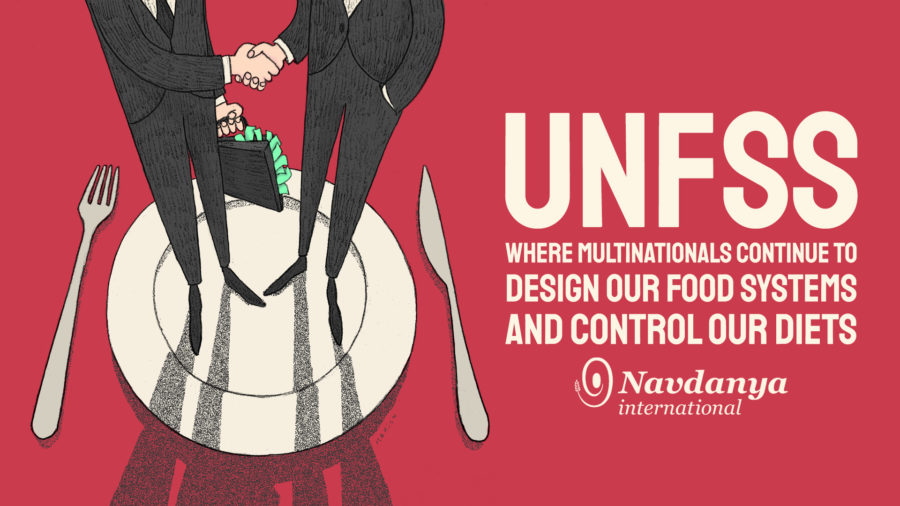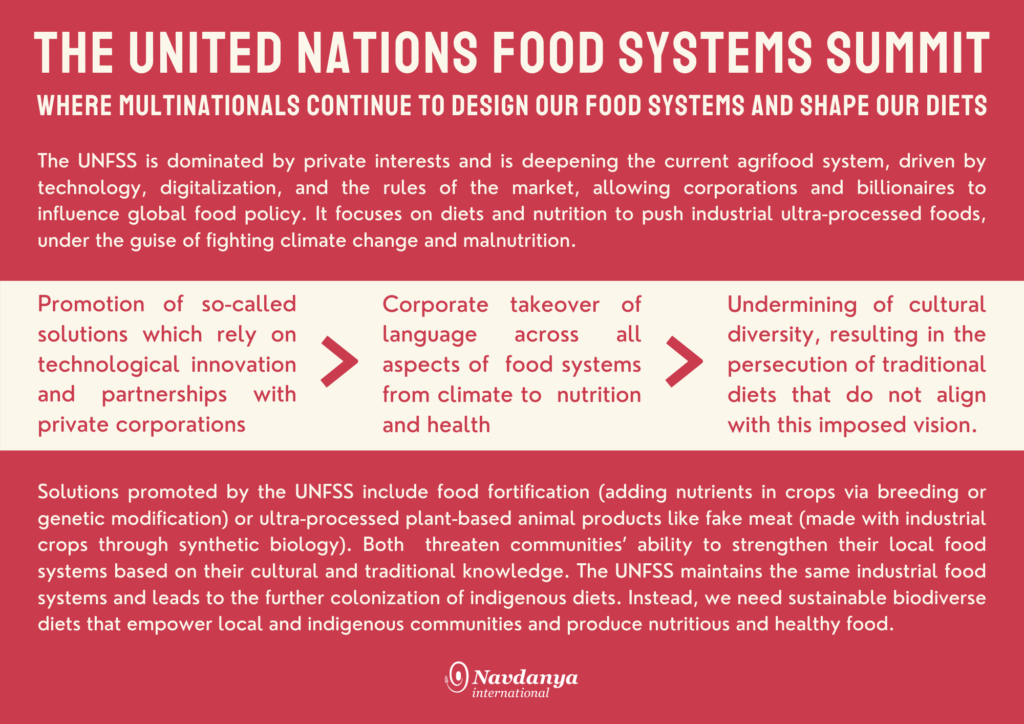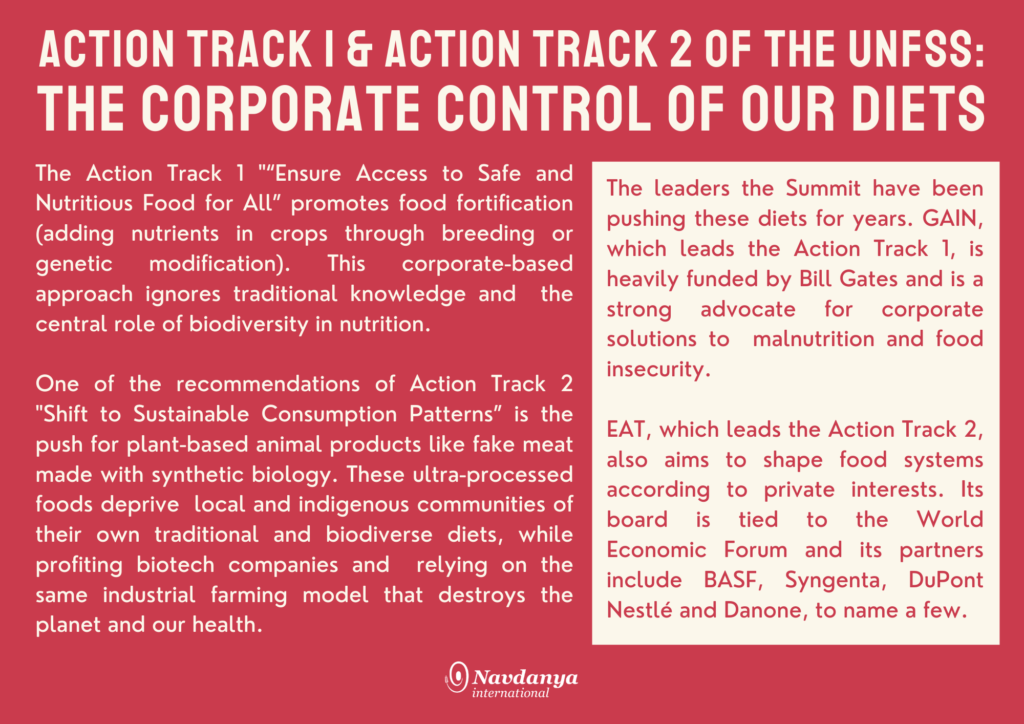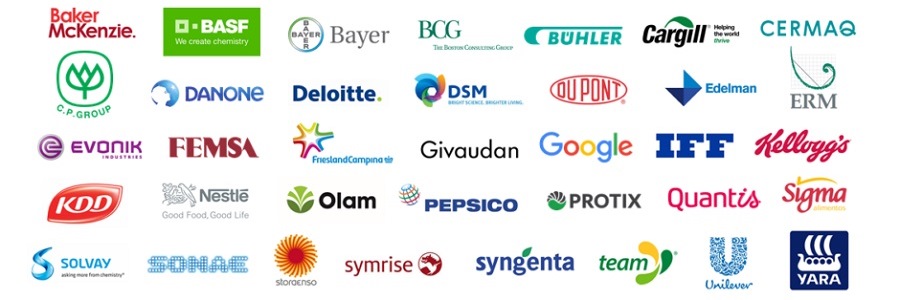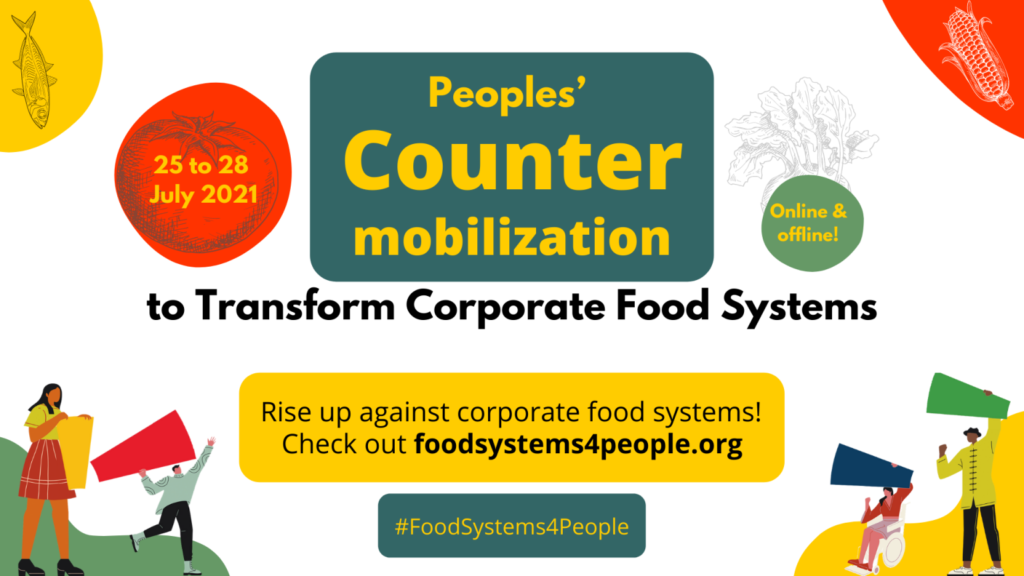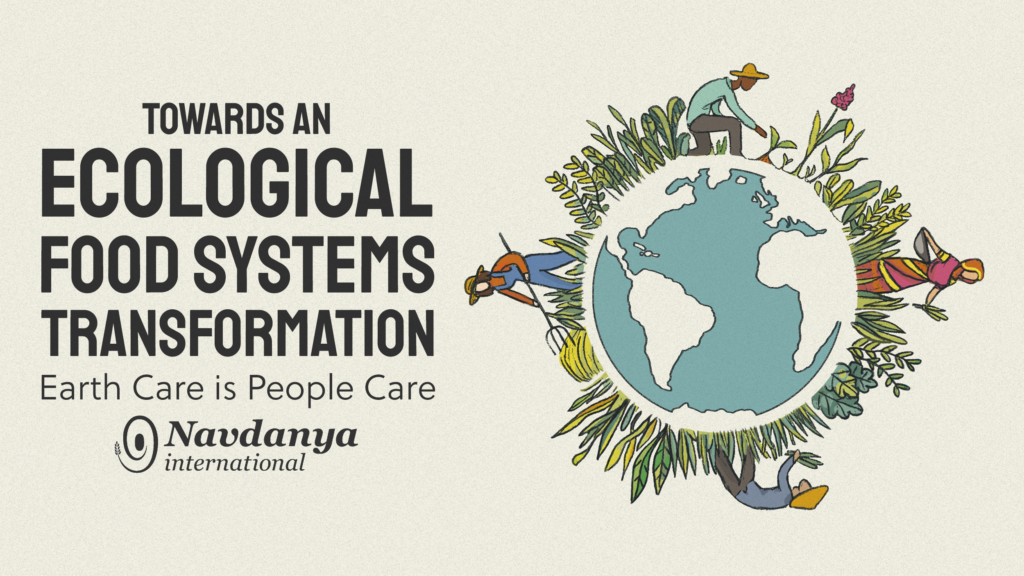UNFSS – Where Multinationals Continue to Design Our Food Systems and Control Our Diets
TRANSCEND MEMBERS, 2 Aug 2021
Navdanya International | Vandana Shiva – TRANSCEND Media Service
27 Jul 2021 – The Pre-Summit of the United Nations Food Systems Summit (UNFSS) taking place in Rome, as a preparative stage to the New York September Summit, is, as expected, going in the wrong direction. As many civil society members, as well as past and current Rapporteurs on the Right to Food, have denounced, this summit is yet another instrument to reinforce corporate control over food and agriculture, while attempting to restrain civil society’s role in global food governance.
The Food Systems Summit was announced in 2019 by UN Secretary-General Antonio Guterres as part of the decade’s actions to achieve the 2030 Sustainable Development Goals. An announcement that followed the formalization of the strategic partnership between the United Nations itself and the World Economic Forum in Davos, a private body composed of over a thousand of the largest and most influential multinationals. The subsequent appointment of Dr. Agnes Kalibata as special UN envoy to the summit only confirms the most pessimistic expectations. Dr. Agnes Kalibata, is the president of AGRA – Bill Gates’s program to push the failed narrative of the Green Revolution in Africa – that is to say, genetically modified seeds, monocultures, agrochemicals, biotechnologies and the free market. This is the recipe that, after having wrought countless damage throughout the world, creating social and environmental crises, is being exported to Africa as part of the ‘new’ solution initiative. Another example of these worrying conflicts of interests is the participation of Sean de Cleene, who is now the WEF’s Head of the “Future of Food Initiative” and who used to serve as Vice President of AGRA as well as Vice President for Global Initiatives, Strategy, and Business Development for Yara, one of the world’s largest chemical fertilizer companies.
The message could not be clearer. The pre-summit in Rome, and the New York summit take place under the strict direct control of multinationals. It is they, the Masters of food, who are in, and want to maintain, control. And if they decide to talk about “transition”, they themselves will do so in their own way, convincing us that their solutions will be ecological enough to keep the current system of interests intact.
And there are plenty of “solutions”, such as next-generation GMOs, more pesticides, artificial meat, geoengineering, precision agriculture and data collection. These ‘game changing’ solutions aim to repair the failures of the industrial food system and, at the same time, are very profitable for the same multinationals who created these failures in the first place. In short, the system cannot be changed, the logic remains the same, private interests must not be undermined but, on the contrary, must be supported by public funds.
Same old rhetoric, same old interests, same old failures
The goal declared by the United Nations is to eliminate world hunger by 2030. A laudable goal but also a tragic irony considering that this is the same slogan used by the Green Revolution which not only failed to achieve the goal but created an enormous amount of negative externalities. In July 2021, the report of the United Nations specialized agencies on food security (SOFI) confirmed the negative trend, aggravated by the Covid 19 pandemic, already recorded in previous years: 9.9% of the world’s population (720-811 million individuals) suffered from hunger during 2020 with an increase of 1.5% compared to 2019. In the same reference year, one in three people did not have access to adequate food: this is 2.37 billion individuals, 320 million more than the previous year. Fighting hunger in the world, the last of the vaunted excuses of multinationals and conspiring governments, has, for some time now, miserably collapsed.
The issue that is not being addressed is that the industrial food system, in addition to not being able to achieve any of its objectives, has had a devastating impact on the ecosystems, health, local economies and communities. Instead, in order to produce massive amounts of ‘cheap’, ultra-processed food externalise multiple hidden costs, particularly those related to health. While these costs continue to be borne by the tax payer, multinationals refuse to take responsibility for the damage they cause by malnutrition, pesticides and chronic diseases.
The neo-liberal ideology of agribusiness, through the imposition of free trade treaties aimed at deregulating strategic sectors and lowering protection for workers and the environment, has also made a decisive contribution to the increase in climate-changing emissions, contamination of land and groundwater, waste, while continuing to fuel the phenomenon of deforestation and land grabbing at the expense of farmers. It is in this way that economic, social and cultural crises are fed. Precisely because the results achieved so far are decidedly embarrassing, today, more than ever, the system must be protected.
But if this is the food system that intends to advance in its project of hegemony on the markets, what happens to all the alternative systems, so widely urged, based on agroecology, on biodiversity, on being in harmony with the earth? 70% of food is still produced by small and medium farmers who use no more than 25% of the resources. The dominant system proposed by UNFSS marginalizes them: the transition is very definitely possible, but only in their own way.
Action Track 1: unsafe food makes safe profits
One of the key aspects of the UNFSS’s proposals is the focus on shifting to ‘sustainable’ diets as a proposed solution to climate change and malnutrition. Behind the language of the necessity of a shift in global diets, the corporate stakeholders who have hijacked the UNFSS have created a trojan horse for industrial, ultra (ultra)-processed fake foods as being profitable but that are false solutions to people’s demands for a more sustainable future, completely ignoring the importance of local, ecological food systems for true food systems transformation.
This tendency is particularly clear in the Summit’s first and second Action Tracks. Action Track 1, “Ensure Access to Safe and Nutritious Food for All”, promotes food fortification on a large-scale as a solution to malnutrition. Food fortification is the process of increasing a few nutrients in certain crops, either through conventional plant breeding, or using biotechnology and genetic modification. This is done through isolating the role of an individual nutrient from the vast web of biodiversity, synthesizing it, and creating a new seed variety to be commercialized and sold. While this technology is described in the Action Track as essential “to tackle head-on the lack of essential vitamins and minerals in the daily diet of vulnerable populations”, it leads to a corporate-based approach that undermines communities’ ability to strengthen their local food systems based on their cultural and traditional knowledge and preferences.
One such example is Golden Rice which has been modified to contain levels of beta-carotene to supposedly prevent Vitamin A deficiencies, even though the FDA found that the levels present do not provide any demonstrable nutritional benefit. The Bill and Melinda Gates Foundation (BMGF) have so far provided US$28 million in funding of Golden Rice, which has also been funded in direct partnership with the organization also started and funded by BMGF and leaders of this Action Track, the Global Alliance for Improved Nutrition (GAIN). Hence, biofortification and technological solutions reinforce the dependence on just a handful of staple crops or individual added ingredients, thus ignoring the central role of biodiversity in nutrition. The false equation mentioned in the Action Track to fortification of salt with iodine to combat iodine deficiency as the example of the miracles of fortification and biofortification, obscure the search for profits from the development of new types of GMO crops, and fail to question why foods need to be fortified in the first place. Nutrients rarely work in isolation, as demonstrated by the traditional Mediterranean diet, which has been hailed a proven protector against several diseases and malnutrition, it has also been acknowledged that no single component or nutrient of that composite diet has a demonstrable protective effect by itself. Thus biofortification directly ignores the importance of biodiversity in diets as the most viable solution to malnutrition. In the end, the mere supplementation of one nutrient does not solve the problem of overall malnutrition, or even why there is decreased nutrition levels in crops and foods to begin with, acting as a surface level solution to the actual problem of global malnutrition.
Action Track 1, with its emphasis on the importance of food safety, also directly ignores the major health risk and unsustainability of toxic residues found in foods and their direct contribution to disease. The Navdanya International Manifesto on Food for Health written by leading health experts and ecologists has identified toxics as one of the leading causes for the disease epidemic. Industrial agriculture and industrial food processing have been degrading our health and diets, both by removing nutrition and health from the food system, and adding chemicals and contaminants across the food chain, from production, to processing, to distribution.
A recently published report by Argentinian organization Naturaleza de Derechos, exposes how residues of pesticides, banned in the EU due to negative health effects, were found in large quantities in a variety of fruits and vegetables destined for international markets and for internal consumption. Agrotoxins are known to be carcinogenic, human hormone disruptors or cholinesterase inhibitors and their synergistic effects are still unknown. Chronic exposure to pesticides and the consequent risks for human health as, even at minimal doses, can have persistent and bioaccumulative effects with associated negative impacts not only on the living species they are created for, but on the entire ecosystem and human health. With all these factors taken into consideration, the problem of food safety addressed by the UNFSS is narrow at best and completely ignores the role of industrial chemicals and processing as a direct threat to human health and environmental sustainability.
GAIN, which leads the Action Track 1, was the first to use the model of public and private sector partners when it was founded in 2001 by Bill Gates. Since then, it has continued to be a strong advocate for corporate solutions to combat malnutrition and food insecurity through an exclusive focus on schemes like biofortification. GAIN also shares many of the same donors as AGRA, like the Rockefeller Foundation, BASF or Unilever, and has received no less than $251 million from the Bill and Melinda Gates Foundation between 2002 and 2014.
Action Track 2: ultra-processed synthetic foods, made with patented technologies, to achieve protein diversification lead only to the diversification of profits
Action Track 2, “Shift to Sustainable Consumption Patterns”, calls for the promotion of artificial and ultra-processed plant-based animal products. Under the guise of “protein diversification”, this so-called solution is a convenient way to replace biodiverse and local diets with ultra-processed synthetic foods, made with patented technologies that profit agrifood corporations and billionaires. These plant and algae-based proteins attempt to mimic the taste and texture of their animal-based counterparts, which according to the Action Track “makes it easy to integrate into daily life without the need to acquire new skills or change cooking behaviour, as they can easily be used in traditional cuisines.” It becomes clear then that the purpose is to incorporate these corporate-owned ingredients and foods in everyone’s plate, including local and indigenous communities, depriving them of their own traditional and sustainable diets. As Navdanya International has exposed, ultra-processed fake foods are reliant on patents, unsafe and untested synthetic biology methods and serve as a way for biotech companies, in alliance with agribusiness giants, to encroach on a bigger market.
Not to mention that synthetic food still relies on an industrial agricultural model, made with crops which are being grown on a large, industrial scale, using monocultures, pesticides, and often, GMOs, thus directly contributing to the very food system that is destroying wildlife, polluting water and soils, and warming up the planet. Because they’re highly processed products and contain toxic chemicals, plant-based substitutes are also likely to have a range of adverse long-term health outcomes, and simply do not meet the nutritional requirements that are fulfilled by real, whole animal and plant foods. Just like with food fortification, simply adding isolated proteins, vitamins, and minerals to diets does not confer the same health benefits as when these nutrients are ingested as whole foods, which contain thousands of compounds acting in synergy.
As for EAT, which leads the Summit’s Action Track 2, it is also determined to shape global food systems according to private interests. EAT’s leadership and board are tied to the World Economic Forum, and its partners include corporations like Nestlé and Danone, both leaders in globalizing ultra processed foods. The recommendations they propose in Action Track 2 come directly from the EAT-Lancet report “Food in the Anthropocene: the EAT–Lancet Commission on healthy diets from sustainable food systems”. While the report attempts to bring out how sustainable food systems transformation could be achieved through the promotion of ‘healthy diets’, it glosses over the direct role of industrial and chemical agriculture in the creation of unsustainable and unhealthy food systems. The report never acknowledges that a shift to healthy diets is reliant on a shift away from the chemical agriculture paradigm – which is at the root of the destruction of the planet’s soil, water, biodiversity and climate, and spread of chronic diseases. Instead the report promotes the fundamentally unsustainable notion of ‘sustainable intensification’ of current food systems, and a global shift to problematic ‘plant-based’ alternatives, thus obscuring the role and connection of commodity foods and globalized food markets and seeming to deliberately try to divert attention away from agroecology.
Nutritious, biodiverse and diverse diets: food democracy against the corporate coup
While these corporations and their partners have been silently pushing these false-solution narratives to continue to push a variety of failed models, the vast platform provided by the UNFSS now gives them direct power to shape global food systems. By purposefully switching to the corporate-favoured and the World Economic Forum invented ‘multi stakeholder’ approach, corporations have now tipped the scale of power in their favor by providing the illusion of inclusivity. As pointed out by the Civil Society Mechanism (CSM), such an approach gives more power to a select few to determine global food policy, while the rest are relegated to the audience, in the end erasing all avenues of accountability and horizontal negotiation – serving to maintain power structures and failed models exactly where they are.
The UNFSS does not offer the paradigm shift and holistic approach that is so urgently needed to achieve food sovereignty, climate resilience and a more just food system. On the contrary, it maintains the same power structure and leads to the further colonization of indigenous foods and diets. It is high time to hold corporations and all the organizations that support them responsible for their actions, and to advocate for truly ecological and sustainable biodiverse diets that empower local and indigenous communities and produce nutritious and healthy food. A genuine transitioning instead to an agroecological paradigm which considers biodiversity and cultural diversity, local food economies and regenerating the planet as central to any kind of food systems transformation.
In response to this corporate hijacking of global food systems, grassroots organizations from all over the world seeking real, agroecological change, which puts at its center food sovereignty and considers the important role of small farmers, women, indigenous peoples and local biodiverse food in the food system, have mobilized a counter-summit to show what real food systems transformation should look like.
True Food Systems Transformation means coming back into alignment with an agroecological and biodiversity-based paradigm building on the multiple, diverse, and ecological paths through which food and agriculture systems in diverse cultures have evolved over millennia and can continue to evolve into the future. It takes into consideration the importance of how traditional diets and knowledge systems have evolved over millennia alongside deep consideration of particular agro-ecosystems and the cultures that evolved within them. Directly resulting in the breeding of resilient and nutritious biodiversity, which was actively managed to guarantee an array of nutritional requirements, as well as the availability of food throughout the seasons, all in tandem with ecosystem conservation and renewal. It is these systems that ensured resilience and longevity of a healthy planet for new generations.
The path of industrial food systems shown by the UNFSS takes us further down the road of the collapse of planetary systems, our health, our economies and our democracy. While the ecological and democratic path shown by small farmers, gardeners and locally organised food communities leads to the regeneration of our planet, our soils, our biodiversity, our rural economies, our health and our democracy.
References:
CSO Letter to UNSG on UN food systems summit, CSM4CFS, March 2020
The UN Food Systems Summit: How Not to Respond to the Urgency of Reform, Michael Fakhri, Hilal Elver and Olivier De Schutter, IPS News, March 2021
The State of Food Security and Nutrition in the World, FAO, 2021
Seeds of Sustenance & Freedom vs Seeds of Suicide & Surveillance, Navdanya, 2019
Earth Day Communiqué, Navdanya, Health of Mother Earth Foundation, Naturaleza De Derechos, 2020
Food for Health Manifesto, Navdanya International, 2019
The Corporate War Against The Planet, People and Democracy, Navdanya, 2016
Gates to a Global Empire, Navdanya International, 2020
Hungry for land: small farmers feed the world with less than a quarter of all farmland, GRAIN, 2014
Biofortified crops or biodiversity? The fight for genuine solutions to malnutrition is on, GRAIN, 2019
Shroff, R., Cortés, C.R. The Biodiversity Paradigm: Building Resilience for Human and Environmental Health. Development (2020). https://doi.org/10.1057/s41301-020-00260-2
Pesticide Residues in Foods in Argentina: Implications for the EU Mercosur Deal, Navdanya International and Naturaleza De Derechos, 2021
Bill Gates & His Fake Solutions to Climate Change, Navdanya International, 2021
A new report sustains unsustainable food systems, Dr Vandana Shiva, 2019
Hundreds of grassroots organizations to oppose the UN Food Systems Summit, CSM4CFS, July 2021
Opening Declaration of the Counter-Mobilization to Transform Corporate Food Systems, CSM4CFS, July 2021
The Future of our Daily Bread: Regeneration or Collapse, Navdanya, 2018
The Future of Food – Farming with Nature, Cultivating the Future, Navdanya International, 2019
________________________________________________
 Navdanya and the Navdanya movement were created by Dr. Vandana Shiva 30 years ago in India to defend Seed and Food sovereignty and small farmers around the world. Navdanya pioneered the movement of seed saving and seed freedom, which began in response to the crisis of erosion of agricultural biodiversity and introduction of GMOs and patents on seeds through intellectual property rights (IPRs) and so-called ‘free trade’ agreements. It has long fought against biopiracy, the patenting of indigenous knowledge by self-interested multinational corporations and won cases related to Neem, basmati rice and wheat in India. Navdanya promotes a new agricultural and economic paradigm, a culture of food for health, where ecological responsibility and economic justice replace the present greed, consumerism and competition which have become dominant in society. It aims at regaining the common good as a foundation for a renewed sense of community, solidarity and culture of peace. We strive to achieve these goals through the conservation, renewal and rejuvenation of the gifts of biodiversity we have received from nature and our ancestors, and to defend these gifts as commons. More…
Navdanya and the Navdanya movement were created by Dr. Vandana Shiva 30 years ago in India to defend Seed and Food sovereignty and small farmers around the world. Navdanya pioneered the movement of seed saving and seed freedom, which began in response to the crisis of erosion of agricultural biodiversity and introduction of GMOs and patents on seeds through intellectual property rights (IPRs) and so-called ‘free trade’ agreements. It has long fought against biopiracy, the patenting of indigenous knowledge by self-interested multinational corporations and won cases related to Neem, basmati rice and wheat in India. Navdanya promotes a new agricultural and economic paradigm, a culture of food for health, where ecological responsibility and economic justice replace the present greed, consumerism and competition which have become dominant in society. It aims at regaining the common good as a foundation for a renewed sense of community, solidarity and culture of peace. We strive to achieve these goals through the conservation, renewal and rejuvenation of the gifts of biodiversity we have received from nature and our ancestors, and to defend these gifts as commons. More…
© Navdanya International 2021
Illustrations: Marion Bessol
Go to Original – navdanyainternational.org
Tags: Agriculture, Banksters, Big Banks, Capitalism, Corruption, Elites, Finance, Greed, Inequality, Post-capitalism, Profits, Right to Food, Super rich, United Nations, Wall Street, World Food Programme WFP, World Order
DISCLAIMER: The statements, views and opinions expressed in pieces republished here are solely those of the authors and do not necessarily represent those of TMS. In accordance with title 17 U.S.C. section 107, this material is distributed without profit to those who have expressed a prior interest in receiving the included information for research and educational purposes. TMS has no affiliation whatsoever with the originator of this article nor is TMS endorsed or sponsored by the originator. “GO TO ORIGINAL” links are provided as a convenience to our readers and allow for verification of authenticity. However, as originating pages are often updated by their originating host sites, the versions posted may not match the versions our readers view when clicking the “GO TO ORIGINAL” links. This site contains copyrighted material the use of which has not always been specifically authorized by the copyright owner. We are making such material available in our efforts to advance understanding of environmental, political, human rights, economic, democracy, scientific, and social justice issues, etc. We believe this constitutes a ‘fair use’ of any such copyrighted material as provided for in section 107 of the US Copyright Law. In accordance with Title 17 U.S.C. Section 107, the material on this site is distributed without profit to those who have expressed a prior interest in receiving the included information for research and educational purposes. For more information go to: http://www.law.cornell.edu/uscode/17/107.shtml. If you wish to use copyrighted material from this site for purposes of your own that go beyond ‘fair use’, you must obtain permission from the copyright owner.
